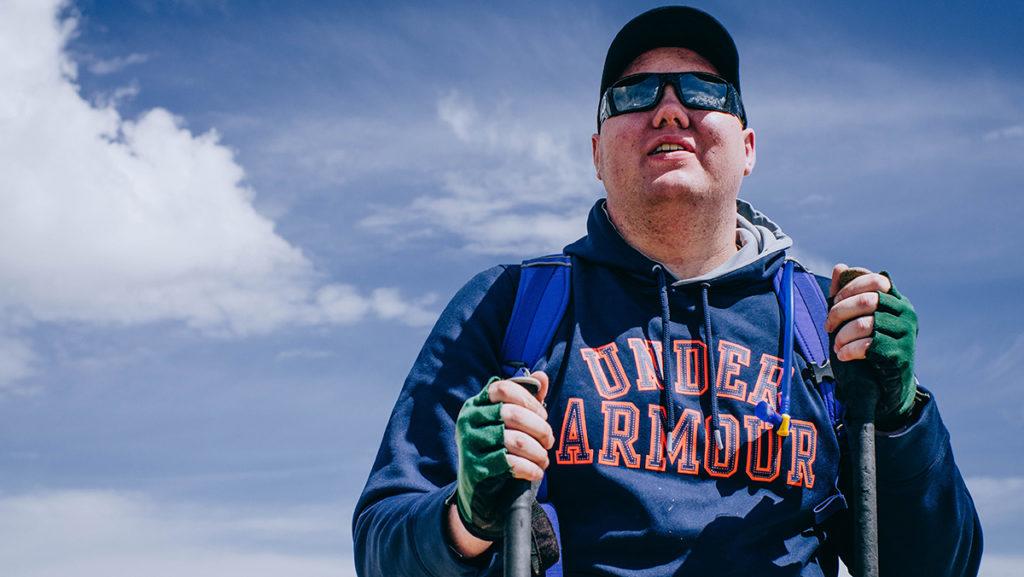Senior Timothy Conners recently self-published his first book, chronicling his bout with cancer and blindness and his philosophy moving forward.
Conners was diagnosed with acute lymphoblastic leukemia in 2010, which relapsed into his optic nerves and left him permanently blind. In his book, “It’s Impossible Until You Do It: Succeeding in the Face of Adversity,” Conners recounts his battles while describing ways readers can live the lives they imagine.
Conners has sold over 100 copies of the book since he self-published it on Amazon on Dec. 10.
Staff Writer Nicole Pimental spoke with Conners about what inspired him to write the book, his system for achieving success and what he hopes readers take away from it.
This interview has been edited for length and clarity.
Nicole Pimental: What inspired you to write this book?
Timothy Conners: Ever since going through everything, all of the trials and tribulations and then coming out and being able to keep moving forward, a lot of people had always talked about me writing a book. … There’s a section of my book where I actually talk about writing it. … It was a lot of talk, and then I said, “OK, I’m going to do it.” … As a public speaker, I wanted to hit on some of the areas I speak about and that I hold really close to myself. …That’s kind of where it started. … I have a speech coach, and I did my first big thing with him January of last year. Basically, after listening there, I brainstormed more what I wanted to do with my project for climbing Mount Kilimanjaro. … There, I saw myself writing a book to help raise funds. … I started [writing officially] on Aug. 27, and I had the whole rough draft written by Sept. 1.
NP: Did you incorporate a lot about your experiences into the book?
TC: [The book] was to really help people dealing with adversity in their life because I’ve been there, and all of us have the ability in our hands to work hard and come out on top. I just hope you don’t have to struggle as much as I did to figure these things out, and maybe my story can help you. It starts off with my freshman year of high school, when I’m 15, and what I think is the “tough stuff” in life. It was in April of that year, my freshman year, I was diagnosed with cancer and how that changed my life. … From there, it goes into how in less than three months [after I went into remission], my cancer came back in my eyes, and I lose my sight in about 48 hours. … Then it’s kind of my slow rebound back: what I’m able to accomplish, what I’m able to inspire and what I’m able to do to help others. And it’s not how I ever pictured life being, yet there are things I’ve gone on to do that I never would have done if this hadn’t gone the way it did.
NP: In your book, you discuss your system for achieving success in the face of adversity. Can you tell me about this system?
TC: It comes off of some of my core values. … I wanted to find an easy way to put those out so people could see them and remember them easily. … The five principles spell out ALIVE. … A is for adventuring outside of your comfort zone and how sometimes we have to do things that make us uncomfortable. … L is live in alignment with who you are, which is really about getting to know you. … The I is incorporate others in your life. It’s about how to work with people, how to surround yourself with the right people but also how to give back to other people. … The V is view the world optimistically. It’s about having a positive outlook on life. … It’s ironic how some people joke around and say I’m a sightless visionary. I say it took losing my sight to really gain my vision. … The last one is experiencing the life you want to live. I think it’s the culmination of everything. Basically, it’s about having that motivation, that “inner fire” I call it. And then it’s about being persistent and having perseverance. … Anything’s impossible until we do it. We have the power in our hands to move forward and make a difference, and I think that’s the whole ALIVE principle.
NP: What are your hopes for this book now that it’s been published? What’s the big takeaway you hope readers get?
TC: I hope if you read my book you would take away that you don’t need to limit yourself based on anything. Whether it’s your economic status, whether it’s the situation you’re in now, whether it’s a disability, whether you’ve been diagnosed with a possibly terminal illness. You still have the power to control what you can control. … We can all achieve a lot more than what we think we can. Our body can achieve a lot more than the mind; the mind is a lot weaker than the body. … No one promised us it would be easy, but we all have that potential to get up and do something every day. It’s impossible until you do it, so go do it.








